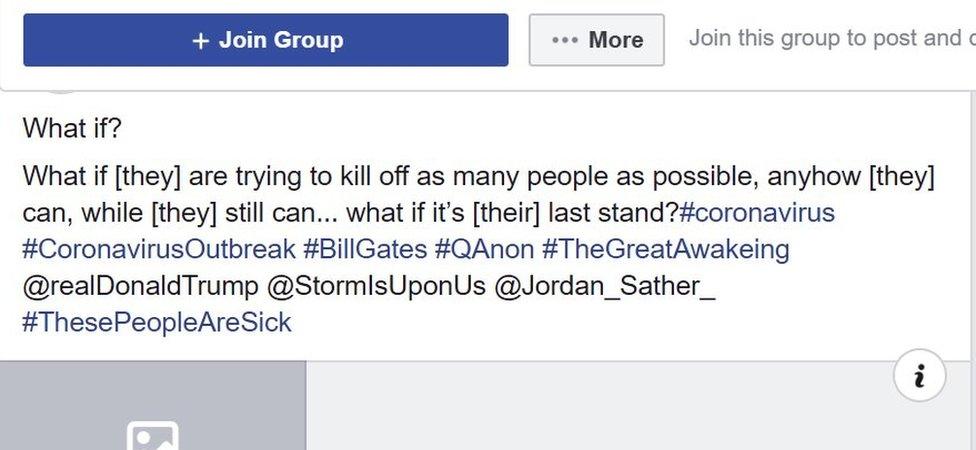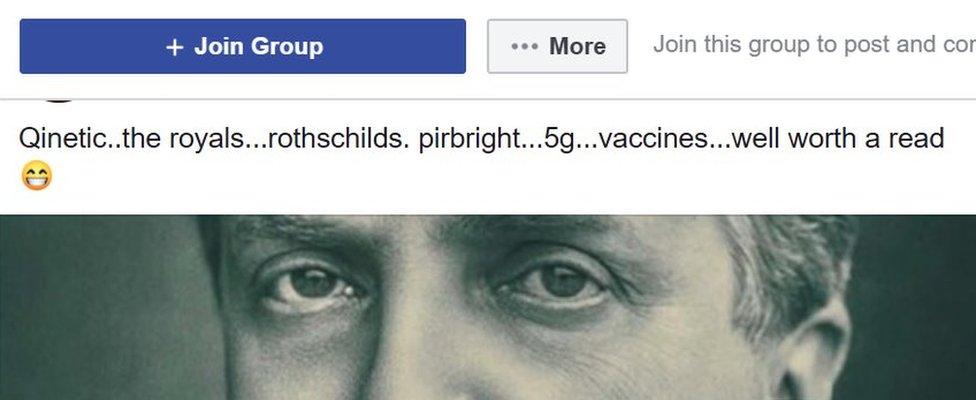Coronavirus: Far-right spreads Covid-19 'infodemic' on Facebook
- Published
WATCH: How the far-right spreads coronavirus disinformation
"What if [they] are trying to kill off as many people as possible" reads one Facebook post.
"Eventually, these scum will release something truly nasty to wipe us all out, but first they have to train us to be obedient slaves" reads another.
A third: "Coronavirus is the newest Islamist weapon."
Many of us by now will have seen something of the "infodemic" the World Health Organization (WHO) warned is swirling across society.
Whether popping into your online timeline or maybe forwarded by a relative, it would have been a rumour or revelation so eye-grabbing, so shockingly different from the norm, that they're hard to ignore.

Yet while false claims about coronavirus have been hard to miss, the interests and ideologies underneath them have been far less visible.
Now, a co-investigation by BBC Click and the UK counter-extremism think-tank Institute of Strategic Dialogue, indicates how both extremist political and fringe medical communities have tried to exploit the pandemic online.
Blaming immigration
Chloe Colliver led the study: "We started doing this research because we were interested to look at the intersection of extremism and disinformation online," she explained.
"We wanted to know how the coronavirus crisis was affecting those trends."
First, researchers collected about 150,000 public Facebook posts sent by 38 far-right groups and pages since January.
They used keywords to spot the key themes of each post, and then algorithms to map what each group tended to speak about overall.
Researchers identified five communities, united by the topic of discussion:
Immigration
Islam
Judaism
LGBT
Elites
The numbers, probably indicative rather than giving the full picture, show that for the first four of these, the scale of activity hadn't increased in volume since the lockdown.
But while there weren't more posts about immigration, for example, discussions about the topic had increasingly linked it to Covid-19.
It's the same for the theme of Islam - the scale was constant, but more and more of the discussion had begun to explicitly link the virus to Muslims, claiming they were exempt from the lockdown, blaming them for its spread, and even hoping they would catch it.
But the fifth and largest community - the one concerning the "elites" - had shown a significant spike in activity during the lockdown.
Discussions included the relationship of these "elites" - like Jeff Bezos, the Rothschilds, George Soros and Bill Gates - to the "deep state", and their alleged role in causing the pandemic.
The researchers discovered that along with tying it to "elites", this community was more likely than any other to think the virus was engineered, over-hyped, or had an existing cure.

Disinformation has also been spread outside Facebook in chat rooms
"This was the big shift," Colliver explained.
"Anti-elite conversations have escalated dramatically, especially driving home the idea the lockdown is a tool of social control."
'Humungous scale'
As they dug deeper into the posts, the researchers took note of many thousands of links directing users to fringe political and health websites.
Newsguard, a website-rating organisation, had identified 34 of them as having shared information about the coronavirus that was "materially false".
"The key interests behind these websites were either fringe politics or fringe health, sometimes both wrapped up together" Ms Colliver continued.
What was surprising to the researchers, however, was the size: "The scale was humungous".

They counted the total number of "interactions" - likes, shares, comments, and so on - which each public post on Facebook had received which contained a link to any of these 34 sites.
Over the same time period:
the WHO's website received 6.2 million interactions
the US Centers for Disease Control (CDC), received 6.4 million
TheEpochTimes.com, a news site whose advertising was banned by Facebook, and which was accused of covert inauthentic activity by both Facebook and Twitter last year, received more than 48 million interactions
The 34 websites together received more than 80 million interactions.
These included:
almost 150,000 interactions for HumansAreFree.com, which made claims that the "plandemic" had been prepared years before the outbreak
about 1.7 million interactions for RealFarmacy.com, which falsely claims that personal ultraviolet lamps are a safe remedy for coronavirus
"Interactions" do not imply agreement, and they were counted for each website overall, not exclusively for misinformation regarding coronavirus.
"We have removed a number of links shared by BBC Click for violating our policies on hate speech and the spread of harmful misinformation," Facebook said in response to the study.
"Where a post does not violate our policies but is deemed by third party fact-checkers to be false, we reduce its distribution and show warning labels marking the post as false. When people see these warning labels, 95% of the time they do not go on to view the original content," it said.
Growing threat
There are also plenty of other ways for the CDC and WHO to get their information out to audiences.
Recent research by the UK watchdog Ofcom suggests that most people learn about the virus from mainstream sources.
However, what the WHO has called an "infodemic" looks more like a parallel world, complete with social organisation, activism and gift shops.
It is one where fringe politics and fringe health have begun to mix. They both carry the idea that the lockdown isn't about safety but about control, which they promise to "liberate" their followers from.
Given its size and energy, it is a world that also may represent a growing threat to the lockdown itself, and the medical and political consensus on which it is grounded.
- Published4 May 2020
